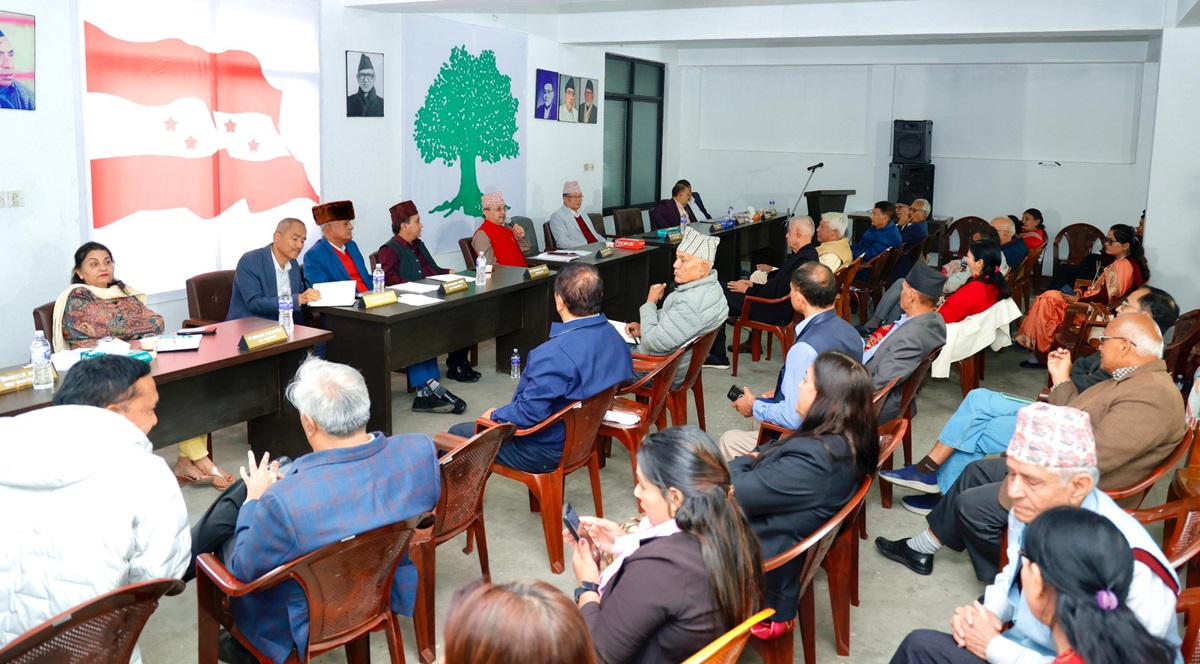The central committee meeting of the Nepali Congress held on Saturday decided to participate in the general election announced for March 5, 2026, but it could not make any decision regarding the party’s general convention.
NC leaders are in favor of adjourning the meeting for a few days to reach a unanimous decision on the general convention. The next meeting has been called for November 27.
Briefing about Saturday’s meeting, NC spokesperson Prakash Sharan Mahat said that the party decided to participate in the National Assembly election to be held on January 25 and the House of Representatives election scheduled for March 5. The party has also decided to register with the Election Commission for both elections.
The deadline for party registration for the National Assembly election is Sunday, while parties must apply for registration for the House of Representatives election by November 26.
According to spokesperson Mahat, the NC has called the dissolution of the House of Representatives “unconstitutional,” but the central committee decided to participate in the general election saying the matter will ultimately be decided by the Supreme Court.
The central committee also concluded that all-party discussions are necessary to ensure peaceful elections under the current circumstances.
However, the issue of whether to hold a regular or special general convention will be discussed in the next meeting, Mahat said.
After Saturday’s central committee meeting, General Secretary Gagan Thapa said that if the party cannot hold a regular general convention, then a special general convention is the only option.
“The Congress must hold its general convention before the election. There are two ways to do this. One is a regular general convention, and the other is a special general convention,” Thapa said. “Our term ends within Mangsir. I have long been saying that this committee’s term should not be extended and that a regular or special general convention must be held within this period.”
“I have proposed holding a regular general convention from December 31 to January 3. Some leaders have been saying that it is not possible to hold a general convention on those dates. If that is the case, then a special general convention within Mangsir is the only alternative,” Thapa told journalists in Sanepa after the meeting.
Thapa also said that a special general convention could be held on December 13 and 14.
“Today we have decided to take part in the general election. The best path for that is to hold a special general convention on December 13 and 14,” he said. “In the current situation, the Congress needs new leadership to guide peaceful politics.”
Thapa added that if the entire party agrees to hold a regular general convention before the end of Paush (mid-January), that would also be appropriate.
“But we cannot say that we will not hold a regular or special general convention by the end of Paush,” he said.
The central committee meeting that began on October 14 had been repeatedly adjourned in an attempt to build consensus. During this time, Acting President Purna Bahadur Khadka held informal discussions with party leaders.
After returning from Singapore following treatment, NC President Sher Bahadur Deuba had also held informal discussions with leaders in an effort to build consensus on the date for the general convention. But the party has yet to reach an agreement on the matter.
President Deuba, Acting President Khadka, General Secretaries Gagan Thapa and Bishwa Prakash Sharma, and leader Shekhar Koirala have all been insisting on holding a regular general convention.
President Deuba, Acting President Khadka, and both general secretaries agree that a regular general convention can be held around the timeline proposed by Thapa for December 31 to January 3. However, some current and former office-bearers argue that the general convention should be held only in Baisakh (mid-April to mid-May) after the elections.
Since President Deuba himself now stands in favor of holding a regular general convention before the elections, it is said that current and former office-bearers close to him will also agree to it.
Twenty-eight central members close to Deuba had met him and said that the general convention must be held before the elections.
Fifty-four percent of general convention delegates submitted signatures to Acting President Khadka on October 15, demanding a special general convention. According to the statute, a special general convention must be organized within three months of receiving such signatures. But the party leadership does not want a special general convention.
In the central committee meeting held on October 14, President Deuba had said that he would hand over leadership through the general convention. The statute also bars Deuba, who has already served two terms as president, from running for a third term.
If a regular general convention is held, the party will get new leadership at all seven levels - from wards to center. If a special general convention is held, only the central committee will change, and a regular general convention must be held within a year.
Since the four-year term of the Deuba-led central committee ends at the end of Mangsir (mid-December), leaders are pushing for a regular general convention.
“The president, acting president, both general secretaries, and Shekhar Koirala have all agreed to hold a regular general convention within Paush,” one office-bearer told Setopati. “But the matter regarding what commitments to make to those who have demanded a special general convention is still pending. Those in favor of a special general convention have also said that if a regular general convention is held within Mangsir, their concerns would be addressed. But will they agree if we push it to Paush? By the end of Paush, even a special general convention becomes mandatory.”
“Since the leadership also held talks with the signatories demanding a special general convention, today’s central committee meeting did not make any decision on the general convention,” another office-bearer told Setopati. “We will postpone the meeting for two or three days and reach a unanimous decision on this matter.”

